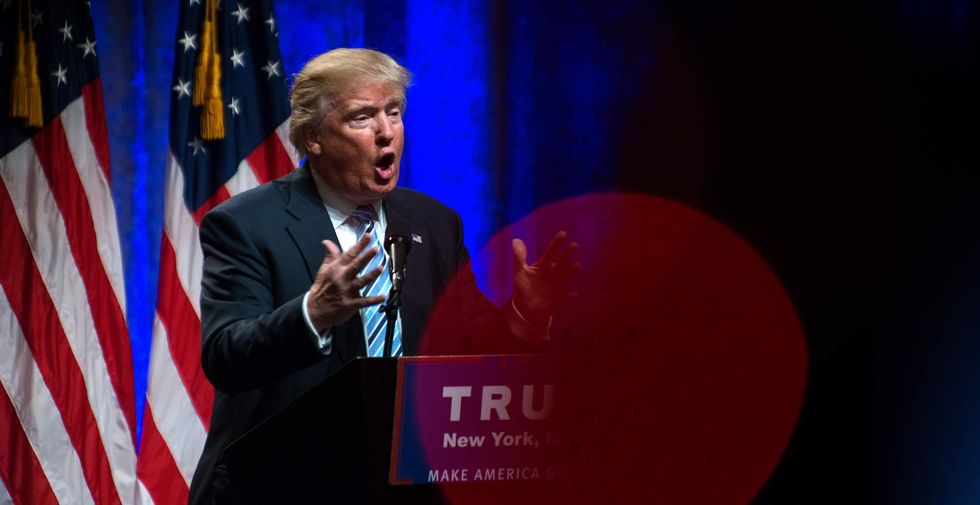
The Knight First Amendment Institute has sent a letter to President Donald Trump, requesting he unblock certain Twitter users because the practice violates the First Amendment of the U.S. Constitution. (2016 file photo/Bryan Thomas/Getty Images)

A free speech group has sent a letter to President Donald Trump, demanding the tweeter-in-chief unblock dissenting Twitter users because, according to them, the practice violates the First Amendment.
The @realDonaldTrump Twitter account has blocked a handful of users that have replied to the president’s 140-character posts with comments that criticized, mocked, or disagreed with his actions and rhetoric, according to a letter sent to the White House by the Knight First Amendment Institute at Columbia University in New York.
The institute, an offshoot of the larger Knight Foundation, is representing Twitter users Holly O’Reilly, @AynRandPaulRyan, and Joseph M. Papp, @joepabike, both of whom have been blocked from the president’s personal Twitter account.
“This Twitter account,” the institute wrote, “operates as a ‘designated public forum’ for First Amendment purposes, and accordingly the viewpoint-based blocking of our clients is unconstitutional.
“We ask that you unblock them and any others who have been blocked for similar reasons,” the letter requested.
Alex Abdo, the institute’s senior staff attorney, argued Twitter is akin to a town hall setting or public forum. Katie Fallow, a senior fellow at the institute, defended the argument by pointing to a case called Davison v. Loudoun County.
In that case, the plaintiff, Brian Davison, argued that deleting a post from the Facebook page maintained by a county supervisor in Loudoun County, Virginia, violated his First Amendment rights. The county, for its part, tried to get the case dismissed by arguing it was the supervisor’s personal account, not an official government profile.
Ultimately, the court sided with Davison, saying the Loudon County cannot discriminate against or block people based on views.
Liberal Harvard Law School professor Laurence Tribe, who specializes in constitutional law, also claimed Trump’s Twitter account is “a public forum subject to [First] Amendment anti-blocking principles.”
But, as Wired points out, not every legal expert buys the institute’s argument.
“The question of whether the president’s Twitter feed is a public forum is a more complicated question,” Neil Richards, a professor at Washington University’s law school, told the magazine. “The law here is famously muddled, because it’s trying to prevent the government from discriminating against people who speak on public streets and parks, but it’s trying to fight the urge to make everything a public forum.”
Had Twitter been explicitly designed by the government as a line of communication between the president and the American people, Richards noted, the institute might have a better case. Additionally, the @realDonaldTrump handle predates Trump’s election and is not even his official government account, @POTUS, which was created and is maintained by the White House.
And, unlike the Facebook case mentioned above, no one who is blocked by Donald Trump's Twitter account is prevented from posting in any given forum on Twitter; rather, the president simply won't read those posts.
At the end of the day, though, the institute’s entire case hinges on the interpretation of the First Amendment, which bars the government from “abridging the freedom of speech” or from blocking the “right of the people peaceably to assemble, and to petition the government for a redress of grievances.”
The First Amendment only protects the right to speak — not the right to be heard. And since the president’s personal Twitter account is not a governmental portal for communication, it seems it would be difficult to prescribe constitutional regulations to it.
The institute’s letter came the same day White House press secretary Sean Spicer said Trump’s tweets “are considered official statements.” Other members of the administration, though, had previously indicated the president’s Twitter posts were not official White House remarks.